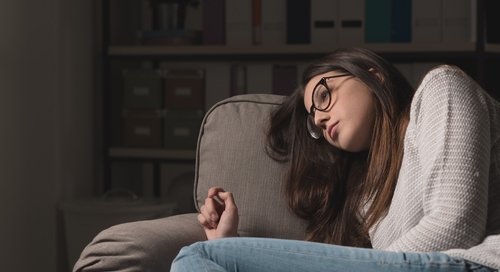Coping with PTSD Symptoms: Tired of Feeling Emotionally Flat or Exhausted?
Spring is here, and many people experience an increased sense of rejuvenation and hope.
For others, the season is a reminder of what is missing in their lives. Despite the lengthening days and the flowering trees, there remains a sense of emptiness.
Perhaps, despite your best intentions, you can’t muster the energy for the creative projects or invigorating activities that used to bring you joy.
If this how it is for you, you are not alone.
Suffering emotional exhaustion, and living with a lack of joy are common consequences of trauma, and some of the most frequent symptoms of PTSD.
It doesn’t seem fair that in addition to having experienced hardship, a person living through trauma should also experience a diminished zest for life. Nonetheless, that is often how it is.
There are two big reasons why trauma seems to affects people in this way:
1. Many try to cope with the feelings of hopelessness, grief, terror and shame by stuffing them down or locking them away.
Unfortunately, we can’t choose which emotions to suppress. Along with keeping all those difficult emotions at bay, we also shut away joy, creativity, connectedness and courage
2. For some, the very nature of the trauma taught them that hope, joy and creativity are dangerous.
Perhaps you were harmed worse when you showed initiative, seemed more alive, were compassionate to someone else, or fought back.
If one or both of these reasons seem to fit, you may feel at a loss for what to do.
Reclaiming your emotional life:
The key is in taking small steps to restore your emotional life.
Accept where you are:
A good way to begin is by acknowledging your ambivalence. On the one hand, you want to be able to feel positive emotions, but on the other hand, you may be scared of your difficult feelings. Take some time to write about that dilemma. Simply putting words to this conflict may change things.
See if you can access a sense of compassion and appreciation toward the fear-- after all it is trying to protect you from further hurt.
Notice the beauty of nature:
If we were hurt by people, nature is often a source of solace and calm. Take some time, every day even if it is just for a minute, to notice the beauty around you. The sunset, the emerging flowers, the quality of the light. Let that awareness settle into you, soothe you.
Allow yourself to be moved, even a little bit, by this beauty. It can’t hurt you.
Engage in small creative or nourishing activities:
Do a small part of an activity that you used to enjoy.
For instance, if you would like to paint, but feel blocked, perhaps spend some time mixing paints or putting some colours on paper. If you liked to cook, maybe prepare a simple salad. If you liked to hike, maybe go for a short walk in the park. Notice, as you are doing it, that this is now. You are ok. Breathe.
Don’t place expectations on yourself to do more, just be with what is.
When to seek help
For some, engaging in these kinds of gentle activities jump starts their emotional life, and they feel increasingly alive and engaged.
For others, the suggestions may seem like mumbo-jumbo, or trying them out feels overwhelming, or makes no difference.
If this is your situation, it does not mean that you are flawed in any way. It simply means that you have some very good reasons for needing to keep emotions in check. This can be the time to seek help-- to experience what trauma treatment can do for you.
Together with a good PTSD therapist, you can gently unpack those reasons, and start to feel safe with all of your emotions, no matter how challenging this may feel now.
I invite you to check out the informative blogs and videos, interesting self tests, and other tools on my website (www.oceansidetherapy.ca). When you are ready, please contact me. I look forward to hearing from you!



